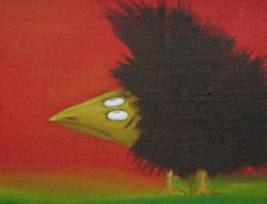“Where did Bertrand go?” I asked.
No one seemed to know. But when I was about to leave, an old man whose back was terribly bowed and who walked with two canes made his way out to my truck. His skin was so black it looked like tar on his bones. “You gonna arrest that boy?” he asked.
“Maybe.”
“Cain’t say he don’t deserve it, but I t’ink somet’ing bad already happened to him.”
“How’s that?” I asked.
“One night right after his auntie and grandmother left, he got aholt of a rowboat and a trailer. I said to him, ‘Where you t’ink you going wit’ a rowboat?’ He pointed to the sout’ and said, ‘Way on out yonder.’
“I said, ‘there ain’t nothing out there but water. All the trees, all the land, is tore up. Ain’t nothing but water far as the eye can see. Ain’t nothing but dead people in that water, either.’
“He said, ‘it don’t matter to me. That’s where I’m going.’”
“He didn’t say where, huh?” I asked.
“It don’t matter where he go. Boy ain’t never had peace. He ain’t gonna have it now.”
I thanked him and drove away. For a long time I could still see him in my rearview mirror, propped on his canes, dust drifting off my wheels into his face, surrounded by amounts of wreckage that perhaps no one can adequately describe.
I didn’t like Bertrand Melancon or, better said, I didn’t like the world he represented. But as I have to remind myself daily, many of the people I deal with did not get to choose the world in which they were born. Some try to escape it, some embrace it, most are overcome and buried by it. After his brother was shot, I think Bertrand tried to become the person he could have been if he’d had a better shake when he was a kid. But who knows? Like Clete says, going up or coming down, it’s only rock ’n’ roll. Bertrand was able to perform a couple of noble deeds before he disappeared. That’s more than we expect from most men who started off life as he did.
Sometimes at twilight, when Clete and I are out on the salt and we can look northward at the vast green-gray misty rim of the Louisiana coastline, I have a fantasy about Bertrand Melancon and my old friend Father Jude LeBlanc, whose only trepidation in life was his fear that the uncontrollable shaking in his hands would cause him to drop the chalice while he was giving Communion.
In my fantasy, I see Bertrand far out on the water, pulling on the oars, his arms pumped with his task, the ruined City of New Orleans becoming smaller and smaller in the distance, a great darkness spreading across the sky just after sunset. The blisters on his hands turn into wounds that stain the wood of the oars with his blood. As the wind rises and the water becomes even blacker, he sees hundreds if not thousands of lights swimming below the surface. Then he realizes the lights are not lights at all. They have the shape of broken Communion wafers and the luminosity that radiates from them lies in the very fact they have been rejected and broken. But in a way he cannot understand, Bertrand knows that somehow all of them are safe now, including himself, inside a pewter vessel that is as big as the hand of God.
